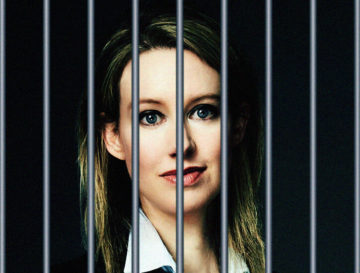 Sarah Arkebauer in The Baffler:
Sarah Arkebauer in The Baffler:
“THIS ISN’T JUST MY JOB. This is who I am. Anyone who doubts my company doubts me,” says Amanda Seyfried as Elizabeth Holmes in the last year’s Hulu show The Dropout. It’s a claim the real-life Holmes managed to make work for her, until it didn’t, tying the success of Theranos, the company she founded in 2003, to her own personal brand as a serious-minded female science genius. Her rhetoric implied that any criticism of the “Edison,” the blood-testing device that promised to diagnose numerous diseases using only a single drop of blood, ought to be brushed off as sexist bias rather than legitimate critique. In making herself the face of this tech, she cultivated an image of authority, power, innovation, and promises kept though the adoption of the black turtleneck made famous by Apple icon Steve Jobs, her low voice, no-nonsense bun, and (when called for) red lipstick.
The Dropout’s title figures the drop of blood through which Theranos supposedly could accomplish never-yet-seen feats of science in the context of what kicked off the whole endeavor: Holmes’s dropping out of Stanford. Her status as a dropout both fueled her success—she was a genius with no time for formal education, à la Mark Zuckerberg—and also invited doubt. And while dropping out of school is neither a harbinger of failure writ large, nor should it be pathologized in a society that ties college education so tightly to a lifetime of debt, in this case, the choice indicated Holmes’s willingness to step beyond her ken. That is to say, to make claims for which she had no scientific chops or backing. In naming its show, then, Hulu relied on its audience coming to Holmes’s story from the skepticism brought on by her downfall.
More here.
